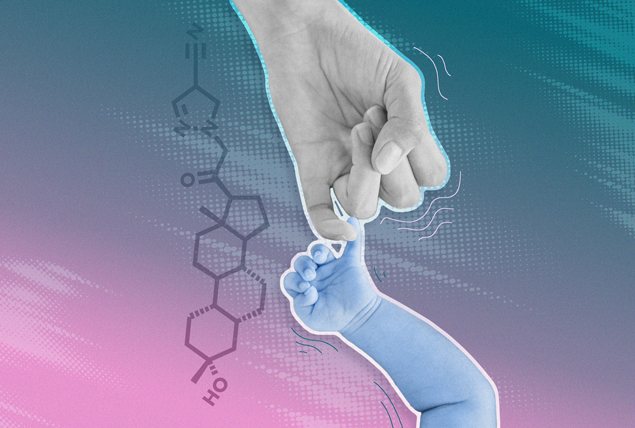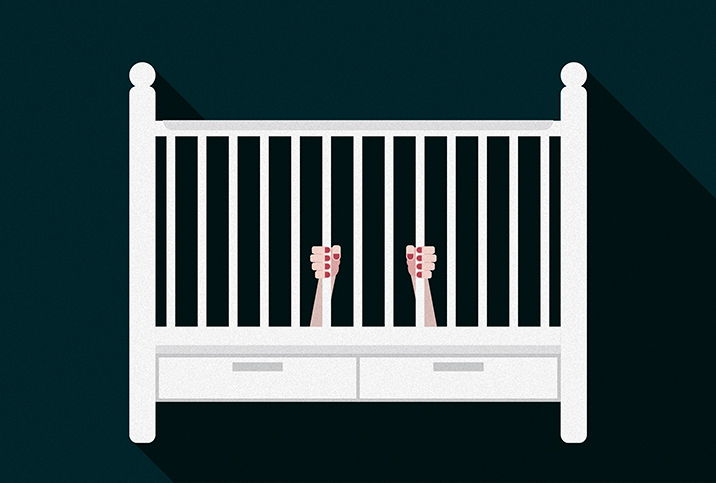What You Need to Know About the First Postpartum Depression Pill

Key Points
- Until recently, the most common treatment method for postpartum depression included antidepressants and talk therapy.
- Zuranolone is the first approved oral medication that strictly targets the symptoms of postpartum depression.
- The pill is taken once a day and can begin to work in as little as two weeks.
A new drug called Zuranolone developed by Sage Therapeutics Inc. and Biogen Inc. has received Food and Drug Administration (FDA) approval to treat postpartum depression.
This once-daily medication is the first of its kind with rapid onset and a 14-day course of treatment. That's good news for the estimated 1 in 7 new birthing parents who experience PPD.
What is postpartum depression?
Postpartum depression (PPD) is common and can occur at any time during the perinatal period or in the weeks before and after birth. Postpartum depression can develop up to one year after having a baby. It's one of the most common complications during and after pregnancy.
Symptoms of PPD can include the following:
- Depressed mood
- Difficulty bonding with the baby
- Insomnia
- Loss of interest in usual hobbies
- Panic attacks
- Restlessness
- Suicidal thoughts
- Thoughts of self-harm or harming the baby
The hormonal and life changes caused by having a baby likely play a role in the development of PPD.
Left untreated, postpartum depression influences the well-being of the mother and baby. The common financial, emotional and physical stressors that accompany caring for an infant, compounded by PPD, can make daily tasks and caring for a baby challenging.
Until recently, options for PPD treatment were limited.
What is the postpartum depression pill?
Zuranolone received FDA approval on August 4, 2023, after the results from two Phase III clinical trials: ROBIN (NCT02978326) and SKYLARK (NCT04442503), according to Clinical Trials Arena.
Zuranolone is an oral neuroactive steroid (NAS) GABA-A receptor-positive allosteric modulator (PAM).
That's a scientific way of saying this medication is distinct from other treatments.
"It is a different class of oral medication than the currently available antidepressant treatments," said Nicole Derish, M.D., a psychiatrist who specializes in women's mental health in Coral Gables, Florida.
What is the current medication treatment plan for PPD?
Postpartum depression treatment has not advanced significantly in the last few decades. Historically, research into treating depression in postpartum or breastfeeding individuals has been lacking.
Before Zuranolone, only one drug was formulated specifically to treat postpartum depression. Called Zulresso, it cannot be taken orally and involves a more complicated process.
"Zulresso (brexanolone) is administered intravenously over the course of two and a half days, or 60 hours. Treatment is in a healthcare setting because of the risk of significant sedation and loss of consciousness," said Susan Hatters-Friedman, M.D., a psychiatrist with University Hospitals Cleveland Medical Center.
If a care team and individual decide the drug is right for them, it poses other accessibility constraints. Without insurance, Zulresso costs $34,000. This does not account for the cost of a stay in a hospital or medical setting or taking time away from work and home.
"In the postpartum, with a new baby, moms are often logically going to be hesitant about getting an IV medication in a healthcare setting—often away from their infant," Hatters-Friedman said.
"If approved, the advantage of Zuranolone compared to brexanolone (Zulresso) is that it would be a pill and would not require IV infusion to reach the brain," Derish said.
Recommended
- How to Manage Postpartum Depression: Through support and healthy adjustments, you'll be more equipped for postpartum depression.
- Postpartum Depression: Identification: Ongoing depression during pregnancy and afterward is a common condition. Recognize the signs of PPD.
- What You Need To Know About Postpartum Psychosis: If delusions set in after childbirth, it could indicate a serious mental health condition.
Taking the medication at home might be a game-changer for new parents with PPD who don't want to wait weeks for an antidepressant to work. Unlike other antidepressants that can take a couple of months to work, Zuranolone is meant to provide rapid relief.
In a randomized control trial of 151 women, patients who took Zuranolone for two weeks displayed a significantly greater reduction in depressive symptoms at day 15 than those who took the placebo, according to a 2021 study.
Zuranolone was generally well-tolerated by participants, according to the same trial. A high proportion of participants remained in remission after the study, even though the course of the drug was for two weeks. Most side effects were mild or moderate.
What are nonmedication options to treat PPD?
Other treatments for PPD include antidepressants and talk therapy, a combination that can be effective.
"It is critical that moms—and families—realize both how common and how treatable postpartum depression is," Hatters-Friedman said.
The right type of treatment depends on the individual and the severity of their symptoms, but many factors—the stigma surrounding depression after a baby is born, cultural factors, underdiagnosis—can stop people from receiving care.
Stigma remains a barrier for people seeking care for postpartum depression, despite its prevalence.
"I've seen a lot of women who waited until they were quite depressed before getting treatment—because of stigma, because of society's misconceptions that being a new mom is always a perfect happy time. In reality, depending on the study, about 1 in 6 women in the postpartum will suffer postpartum depression," Hatters-Friedman said.
Other treatment gaps for postpartum depression include underdiagnosis and improper screening. Up to half of those with PPD go undiagnosed, a 2006 report suggested.
Receiving timely care for PPD is important for the health of the mother and the baby.
"The sooner that someone seeks help, the easier it is for the medication and/or the therapy to work," Hatters-Friedman said. "While new medications potentially hold great promise, various antidepressant medications can be used in both pregnancy and the postpartum—to treat depression. And treating depression helps both the mother and the whole family."
The bottom line
The approval of Zuranolone can help new mothers experiencing postpartum depression feel better faster. Unlike other medication options, Zurranolone is available as a once-daily dose for two weeks.
Postpartum depression can lead to chronic depression when left untreated and can become dangerous. Schedule an appointment with your doctor if you are experiencing the symptoms of PPD.


















